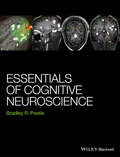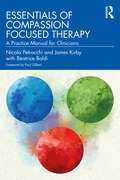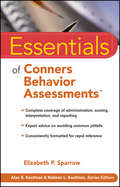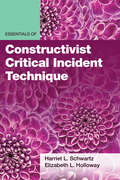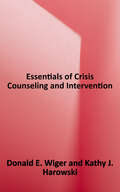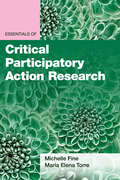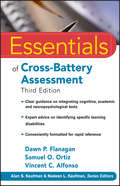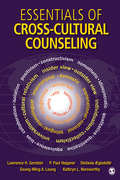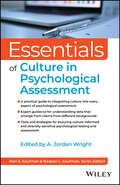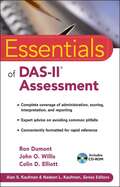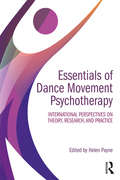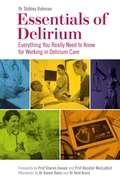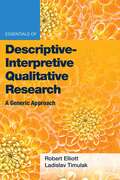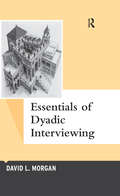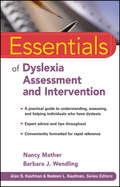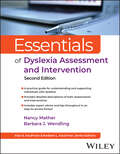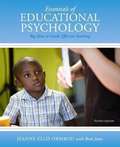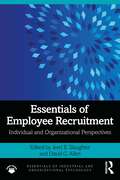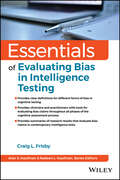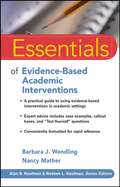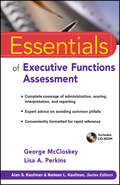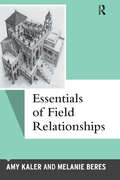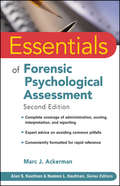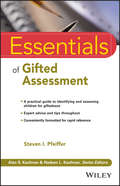- Table View
- List View
Essentials of Cognitive Neuroscience
by Bradley R. PostleEssentials of Cognitive Neuroscience guides undergraduate and early-stage graduate students with no previous neuroscientific background through the fundamental principles and themes in a concise, organized, and engaging manner. Provides students with the foundation to understand primary literature, recognize current controversies in the field, and engage in discussions on cognitive neuroscience and its future Introduces important experimental methods and techniques integrated throughout the text Assists student comprehension through four-color images and thorough pedagogical resources throughout the text Accompanied by a robust website with multiple choice questions, experiment vidoes, fMRI data, web links and video narratives from a global group of leading scientists for students. For Instructors there are sample syllabi and exam questions
Essentials of Compassion Focused Therapy: A Practice Manual for Clinicians
by James Kirby Nicola Petrocchi Beatrice BaldiThis book presents a comprehensive, 12-module transdiagnostic program to deliver Compassion Focused Therapy (CFT) in group and individual settings.Offering an accessible step-by-step guide to the essentials of CFT and its application to a range of contexts, this book provides clinicians with clear guidelines to deliver the modules and adapt them to the specific needs of target groups/individuals. Each module focuses on a theme, which is explained through an introductory basic science for the clinician and then developed and explored through psychoeducation for the client, followed by a variety of experiential exercises. Also included are examples of CFT case formulations, therapist scripts, and client handouts. As an additional resource, clinicians are provided access to www.cftmanual.com, an online platform with downloadable support material such as guided audio meditations, videos of brief Yoga sessions, educational videos, and supplementary handouts.This practice guide will be the authoritative resource in CFT for clinicians, trainers, supervisors, researchers, and clients with previous CFT experience who wish to deepen their practice.
Essentials of Conners Behavior Assessments
by Sparrow Elizabeth P.Quickly acquire the knowledge and skills you need to confidently administer, score, and interpret the Conners 3, Conners CBRS, and Conners EC The Conners 3rd Edition (Conners 3), Conners Comprehensive Behavior Rating Scales (Conners CBRS), and Conners Early Childhood (Conners EC) are sophisticated tools for the assessment of behavioral, emotional, social, academic, and developmental issues in children and adolescents. Authored by Elizabeth Sparrow, who was mentored by Keith Conners and worked closely with him on the Conners assessments, Essentials of Conners Behavior Assessments offers a comprehensive and user-friendly guide for mental health professionals who need to understand and apply results from these Conners assessments in educational, clinical, and research settings. Like all the volumes in the Essentials of Psychological Assessment series, this book is designed to help busy mental health practitioners, and those in training, quickly acquire the knowledge and skills they need to make optimal use of major psychological assessment instruments. Each chapter features numerous callout boxes highlighting key concepts, bulleted points, and extensive illustrative material, as well as test questions that help you gauge and reinforce your grasp of the information covered. The best practical guide to the Conners 3, Conners CBRS, and Conners EC, Essentials of Conners Behavior Assessments provides instruction for rating scale selection, administration, scoring, and interpretation, and advanced approaches to analyzing results, integrating findings from multiple Conners assessments, and evaluating response to intervention.
Essentials of Constructivist Critical Incident Technique (Essentials of Qualitative Methods Series)
by Harriet L Schwartz Elizabeth L. HollowayThis book is a step-by-step guide to designing and realizing a constructivist critical incident (Constructivist CIT) study. This qualitative methodology explores critical moments in people's lived experiences. The authors offer the first comprehensive overview of Constructivist CIT, a structured, yet flexible methodology used to explore lived experience and improve practice and process by studying critical or meaningful moments and experiences. The authors introduce Constructivist CIT in relation to its well-established parent method Critical Incident Technique, which has been used widely in the social sciences, health care, and business. Readers will learn how to ensure the trustworthiness of their study&’s design, collect and analyze the data, and write up and submit their study for publication. An intuitive method, Constructivist CIT is an accessible method for novice researchers as well as seasoned scholars expanding their qualitative repertoire.
Essentials of Crisis Counseling and Intervention
by Donald E. Wiger Kathy J. HarowskiA practical guide to effective crisis counseling and intervention. Essentials of Crisis Counseling and Intervention <p><p>offers practical, field-tested methods for dealing with traumatic and life-changing events. This helpful manual presents useful strategies for crisis prevention, functioning effectively during a crisis, caring treatment approaches, and aftercare--and describes how to assess the extent to which a crisis has impacted an individual. Important legal aspects of crisis counseling are also highlighted--such as risk, suicidality, and documentation--as well as helpful details on how to prevent potential malpractice issues related to crisis intervention. <p><p> Essentials of Crisis Counseling and Intervention gives clear explanations of proven practice techniques and examples of effective interventions. It provides an accessible and practical guide to navigating through the complexities of any type of crisis situation, including natural disasters, community violence, and personal tragedy. Unique coverage is presented on such topics as group intervention, incorporating spirituality into treatment, community resources, coordinating efforts of crisis-response personnel, and the roles of various crisis workers, including instructions for how to prepare intellectually and emotionally for crisis situations. <p><p> As part of the Essentials of Mental Health Practice series, this book provides the information mental health professionals need to practice knowledgeably, efficiently, and ethically in today's behavioral health care environment. Each concise chapter features numerous callout boxes highlighting key concepts, bulleted points, and extensive illustrative material, as well as "Test Yourself" questions that help you gauge and reinforce your grasp of the information covered.
Essentials of Critical Participatory Action Research (Essentials of Qualitative Methods Series)
by Michelle Fine María Elena TorreThe brief, practical texts in the Essentials of Qualitative Methods series introduce social science and psychology researchers to key approaches to qualitative methods, offering exciting opportunities to gather in-depth qualitative data and to develop rich and useful findings. In this book, Michelle Fine and Maria Elena Torre provide an introduction to critical participatory action research, an approach that reveals the everyday stories of struggle and survival of the persons being studied, combats social injustice, and leverages social science research for action. Critical participatory action research challenges the narrow ways in which research has traditionally been conducted, and elevates the voices and perspectives of formerly marginalized groups.About the Essentials of Qualitative Methods book series: Even for experienced researchers, selecting and correctly applying the right method can be challenging. In this groundbreaking series, leading experts in qualitative methods provide clear, crisp, and comprehensive descriptions of their approach, including its methodological integrity, and its benefits and limitations. Each book includes numerous examples to enable readers to quickly and thoroughly grasp how to leverage these valuable methods.
Essentials of Cross-Battery Assessment
by Dawn P. Flanagan Vincent C. Alfonso Samuel O. OrtizThe most up-to-date resource of comprehensive information for conducting cross-battery assessments The Cross-Battery assessment approach--also referred to as the XBA approach--is a time-efficient assessment method grounded solidly in contemporary theory and research. The XBA approach systematically integrates data across cognitive, achievement, and neuropsychological batteries, enabling practitioners to expand their traditional assessments to more comprehensively address referral concerns. This approach also includes guidelines for identification of specific learning disabilities and assessment of cognitive strengths and weaknesses in individuals from culturally and linguistically diverse backgrounds. Like all the volumes in the Essentials of Psychological Assessment series, Essentials of Cross-Battery Assessment, Third Edition is designed to help busy practitioners quickly acquire the knowledge and skills they need to make optimal use of psychological assessment instruments. Each concise chapter features numerous callout boxes highlighting key concepts, bulleted points, and extensive illustrative material, as well as test questions that help you to gauge and reinforce your grasp of the information covered. Essentials of Cross-Battery Assessment, Third Edition is updated to include the latest editions of cognitive ability test batteries , such as the WISC-IV, WAIS-IV, and WJ III COG, and special purpose cognitive tests including the WMS-IV and TOMAL-II. This book now also overs many neuropsychological batteries such as the NEPSY-II and D-KEFS and provides extensive coverage of achievement batteries and special purpose tests, including the WIAT-III, KM-3, WRMT-3 and TOWL-4. In all, this book includes over 100 psychological batteries and 750 subtests, all of which are classified according to CHC (and many according to neuropsychlogical theory. This useful guide includes a timesaving CD-ROM, Essential Tools for Cross-Battery Assessment (XBA) Applications and Interpretation, which allows users to enter data and review results and interpretive statements that may be included in psychological reports. Note: CD-ROM/DVD and other supplementary materials are not included as part of eBook file.
Essentials of Cross-Cultural Counseling
by Lawrence H. Gerstein Dr P. Paul Heppner Dr Stefania Aegisdottir Dr Seung-Ming A. Leung Dr Kathryn L. NorsworthyEssentials of Cross-Cultural Counseling is a brief, supplemental book derived from the International Handbook of Cross-Cultural Counseling. Edited by a high-profile team with international expertise, the book focuses on the history, issues, challenges, and opportunities for the counseling profession worldwide. It includes nine chapters discussing topics such as cultural, cross-cultural, and cross-national counseling; the counseling profession both domestically and internationally; the theoretical and methodological issues when studying culture; the challenges and opportunities of cross-cultural and cross-national collaboration; and the future of cross-cultural counseling.
Essentials of Culture in Psychological Assessment (Essentials of Psychological Assessment)
by A. Jordan WrightIntegrate cultural awareness and humility into your psychological assessments In Essentials of Culture in Psychological Assessment, editor Jordan A. Wright curates a collection of invaluable work that helps psychological assessors be more deliberate in acknowledging—and, in some cases, mitigating—the role that culture and cultural experiences can play in the psychological assessment process. It encourages assessors to think about cultural issues as they relate to clients, including the cultural background clients bring with them to the assessment and the oppressive experiences they may have endured. You'll explore the roles that power and privilege might play in the assessment process and the cultural variables that affect the interaction with clients and the process as it unfolds. You'll also discover how culture and oppression can be considered and accounted for throughout the entire lifecycle of a psychological assessment. Readers will also find: Tools and strategies for conducting culture-informed and diversity-sensitive psychological assessment Techniques for understanding the data that arises from clients from various backgrounds Ways to integrate culture into every aspect of psychological assessment Perfect for psychology clinicians of all kinds, Essentials of Culture in Psychological Assessment is a can't-miss resource that will inform, improve, and transform the way you conduct psychological testing and assessment on clients from a variety of cultural backgrounds.
Essentials of DAS-II Assessment
by Ron Dumont John O. Willis Colin D. ElliottEssentials of DAS-IIƠAssessment is the best source of information on the new edition of the DASƠinstrument, providing you with illuminating case reports, expert assessment of the test?s relative strengths and weaknesses, and valuable advice on its clinical applications. Written by Ron Dumont, John Willis, and Colin Elliott, this book is accompanied by a CD-ROM containing customizable Excel worksheets, PDF files, and Microsoft Word documents to conveniently allow you to add your own DAS-II evaluation results.Note: CD-ROM/DVD and other supplementary materials are not included as part of eBook file.
Essentials of Dance Movement Psychotherapy: International Perspectives on Theory, Research, and Practice
by Helen PayneEssentials of Dance Movement Psychotherapy contributes to the global interest in embodiment approaches to psychotherapy and to the field of dance movement psychotherapy specifically. It includes recent research, innovative theories and case studies of practice providing an inclusive overview of this ever growing field. As well as original UK contributions, offerings from other nations are incorporated, making it more accessible to the dance movement psychotherapy community of practice worldwide. Helen Payne brings together well-known, experienced global experts along with rising stars from the field to offer the reader a valuable insight into the theory, research and practice of dance movement psychotherapy. The contributions reflect the breadth of developing approaches, covering subjects including: • combining dance movement psychotherapy with music therapy; • trauma and dance movement psychotherapy; • the neuroscience of dance movement psychotherapy; • the use of touch in dance movement psychotherapy; • dance movement psychotherapy and autism; • relational dance movement psychotherapy. Essentials of Dance Movement Psychotherapy will be a treasured source for anyone wishing to learn more about the psychotherapeutic use of creative movement and dance. It will be of great value to students and practitioners in the arts therapies, psychotherapy, counselling and other health and social care professions.
Essentials of Delirium: Everything You Really Need to Know for Working in Delirium Care
by Dr Shibley RahmanDetailed knowledge and specific awareness of delirium is crucial in elderly care, due in part to the overlap with delirium and dementia. This introductory reference guide can be used by professionals and students to expand their understanding and skills in delirium care to better respond to the needs of people under their care. There are also detailed chapters on quality improvement and educational initiatives which will be of great help to the delirium workforce in delivering improved care.
Essentials of Descriptive-Interpretive Qualitative Research: A Generic Approach
by Ladislav Timulak Robert ElliotThe brief, practical texts in the Essentials of Qualitative Methods series introduce social science and psychology researchers to key approaches to capturing phenomena not easily measured quantitatively, offering exciting, nimble opportunities to gather in-depth qualitative data. <p><p> This book offers a no-nonsense, step-by-step approach to qualitative research in psychology and related fields, presenting principles for using a generic approach to descriptive-interpretive qualitative research. Based on more than 50 years of combined experience doing qualitative research on psychotherapy, the authors offer an overarching framework of best research practices common to a wide range of approaches. <p><p> About the Essentials of Qualitative Methods book series: Even for experienced researchers, selecting and correctly applying the right method can be challenging. In this groundbreaking series, leading experts in qualitative methods provide clear, crisp, and comprehensive descriptions of their approach, including its methodological integrity, and its benefits and limitations. Each book includes numerous examples to enable readers to quickly and thoroughly grasp how to leverage these valuable methods.
Essentials of Dyadic Interviewing (Qualitative Essentials #13)
by David L MorganTraditional qualitative interviews typically involve a single subject; interviews of dyads rarely appear outside marketing research and family studies. Experienced qualitative researcher David Morgan’s brief guide to dyadic interviewing provides readers with a road map to expand this technique to many other settings. In dyadic interviews, the interaction and co-constructions of the two subjects provide the data for the researcher. Showing the advantages and disadvantages of interviewing two people at once, the first book on this research topic -covers key issues of pair rapport, ethics, confidentiality, and dealing with sensitive topics;-describes the entire process from selecting the participants to the role of the moderator to analyzing results;-uses examples of grad student experiences, physician behavior, substance abuse, services to elderly, and dementia patients to show its many applications.
Essentials of Dyslexia Assessment and Intervention (Essentials Of Psychological Assessment Series #89)
by Nancy Mather Barbara J. WendlingQuickly acquire the knowledge and skills you need to effectively understand, assess, and treat individuals struggling with dyslexiaEssentials of Dyslexia Assessment and Intervention provides practical, step-by-step information on accurately identifying, assessing, and using evidence-based interventions with individuals with dyslexia. Addressing the components that need to be considered in the assessment of dyslexia--both cognitive and academic--this book includes descriptions of the various tests used in a comprehensive dyslexia assessment along with detailed, evidence-based interventions that professionals and parents can use to help individuals struggling with dyslexia.Like all the volumes in the Essentials of Psychological Assessment series, each concise chapter features numerous callout boxes highlighting key concepts, bulleted points, and extensive illustrative material, as well as test questions that help you gauge and reinforce your grasp of the information covered.Providing an in-depth look at dyslexia, this straightforward book presents information that will prepare school psychologists, neuropsychologists, educational diagnosticians, special education teachers, as well as general education teachers, to recognize, assess, and provide effective treatment programs for dyslexia. The book is also a good resource for parents who are helping a child with dyslexia.A practical guide to understanding, assessing, and helping individuals who have dyslexiaExpert advice and tips throughoutConveniently formatted for rapid referenceOther titles in the Essentials of Psychological Assessment series:Essentials of Assessment Report WritingEssentials of School Neuropsychological AssessmentEssentials of Evidence-Based Academic InterventionsEssentials of Response to InterventionEssentials of Processing AssessmentEssentials of Conners Behavior AssessmentsEssentials of Cross-Battery Assessment, Second EditionEssentials of WISC-IV Assessment, Second Edition
Essentials of Dyslexia Assessment and Intervention (Essentials of Psychological Assessment #89)
by Nancy Mather Barbara J. WendlingExpert guidance on the features of dyslexia and the most effective treatment options Essentials of Dyslexia Assessment and Intervention allows psychologists, graduate students, reading specialists, and others to quickly acquire the knowledge and skills needed to treat individuals struggling with dyslexia. This book provides step-by-step guidance on accurately identifying, assessing, and using evidence-based interventions with individuals with dyslexia. Addressing the components that need to be considered in the assessment of dyslexia—both cognitive and academic—this book includes descriptions of the various tests used in a comprehensive dyslexia assessment along with detailed, evidence-based interventions that professionals and parents can use to help individuals struggling with dyslexia. A part of the trusted Essentials of Psychological Assessment series, this book features concise chapters designed to facilitate retention of key concepts with callout boxes, bullet points, and extensive illustrations. Additionally, the chapters contain questions to test your knowledge and reinforce what you have learned. This updated second edition covers essential topics for today’s professionals, including genetic factors, reading instruction, technology, and dyslexia in schools. Gain an understanding of the neurological and genetic causes and risk factors of dyslexia Assess reading fluency, phonological awareness, and other markers of dyslexia Discover the latest interventions for improving reading and spelling in individuals with dyslexia Learn to pick up on cues that help with early identification and treatment of dyslexiaProviding an in-depth look at dyslexia, this straightforward book presents information that will prepare school psychologists, neuropsychologists, educational diagnosticians, special education teachers, as well as general education teachers, to recognize, assess, and provide effective treatment programs for dyslexia. The book is also a good resource for parents who are helping a child with dyslexia.
Essentials of Educational Psychology: Big Ideas to Guide Effective Teaching
by Jeanne Ellis OrmrodFocused on the "big ideas" of educational psychology, Essentials of Educational Psychology presents the core concepts and research-based strategies that are most directly applicable to teaching and learning.
Essentials of Employee Recruitment: Individual and Organizational Perspectives (Essentials of Industrial and Organizational Psychology)
by David G. Allen Jerel E. SlaughterThis book provides an insightful and comprehensive summary of the field of employee recruitment. Written from a scientific evidence-based perspective, and with contributions from global experts, it reviews the relevant research in the various areas of recruitment, considers the most pressing current issues in studying recruitment topics, and designs future research agendas for the field.Organized into four sections, the text begins by presenting an overview of the study of recruitment, before moving on to demonstrate effective ways of attracting talent, covering methodology, practices, and organizational characteristics. The third section focuses on recruiting specific populations, including women, ethnic and racial minorities, college students, and employed job seekers. This book concludes by providing practical perspectives, with chapters describing how the applicant population is changing, how applicants interact with people and technology during recruitment, the interaction of applicant and organizational political ideology, and offering insights on how to design recruitment programs today and in the future.A foundational resource on employee recruitment, this is the ideal text for scholars and graduate students in industrial and organizational psychology and human resource management. It will also interest practitioners working in the area, along with executive and line managers tasked with responsibility for talent management.
Essentials of Evaluating Bias in Intelligence Testing (Essentials of Psychological Assessment)
by Craig L. FrisbyThorough overview of the history, viewpoints, and research findings of bias in intelligence testing Essentials of Evaluating Bias in Intelligence Testing delivers a comprehensive overview of potential biases that can come to light when making use of IQ tests across demographics, detailing where bias can work its way into IQ test selection, standardization, content, administration/scoring, and interpretation and providing key foundational knowledge on what IQ test bias is versus what it is not as well as the history of bias claims in recent decades. Research findings are included throughout the book to provide key context. Some of the topics discussed in this book include: The Larry P. v. Wilson Riles trial decision of 1979, which prohibited the use of IQ tests for placing Black students in special education programs, and its carryover to today The heritability of IQ scores, the “nature/nurture” issue, and the role of IQ in the stratification of subpopulation groups in society Implicit assumptions within claims of standardization bias, including that all population subgroups must display equal mean scores and that racial/ethnic groups are internally homogeneous Essentials of Evaluating Bias in Intelligence Testing is an essential read for educators, academics, and administrators seeking to understand the full picture on IQ testing and its validity or lack thereof across different demographics.
Essentials of Evidence-Based Academic Interventions
by Nancy Mather Barbara J. WendlingEssentials of Evidence-Based Academic Interventions puts at your fingertips the successful instructional techniques and materials necessary for accurate and effective use of evidence-based interventions. Written by Barbara Wendling and Nancy Mather, two experts in educational assessment and intervention, this intervention-oriented reference presents clear descriptions of research-based interventions in the areas of: phonological awareness and beginning reading phonics; phonics and sight word instruction; reading fluency; vocabulary and reading comprehension; spelling, handwriting, and written expression; basic math skills; and math problem-solving.
Essentials of Executive Functions Assessment
by George Mccloskey Lisa A. PerkinsQuickly acquire the knowledge and skills you need to understand and assess children and adolescents struggling with executive functions deficitsEssentials of Executive Functions Assessment is designed for professionals who want to learn how to administer, score, and interpret popular assessments of executive functions, including the Wisconsin Card Sorting Test (WCST), the Behavior Rating Inventory of Executive Functions (BRIEF, BRIEF-SR), the Delis-Kaplan Executive Function System (D-KEFS), and the NEPSY-II, among others.Like all the volumes in the Essentials of Psychological Assessment series, this book is designed to help busy mental health professionals quickly acquire the knowledge and skills they need to make optimal use of major psychological assessment instruments. Each concise chapter features numerous callout boxes highlighting key concepts, bulleted points, and extensive illustrative material, as well as test questions that help you gauge and reinforce your grasp of the information covered.Executive functions experts George McCloskey and Lisa Perkins also provide general techniques that can be used to interpret aspects of executive functions using tests that are not specifically designed as measures of executive functions. The book's accompanying CD-ROM contains interview forms for parents and teachers, student observation forms, reference material on the BRIEF® and other rating scales, case-study reference material, and several sample psychoeducational assessment reports.Other titles in the Essentials of Psychological Assessment series:Essentials of Assessment Report WritingEssentials of WAIS-IV Assessment, Second EditionEssentials of WISC-IV Assessment, Second EditionEssentials of WIAT-III and KTEA-II AssessmentEssentials of WJ III Cognitive Abilities Assessment, Second EditionEssentials of Evidence-Based Academic InterventionsEssentials of Processing AssessmentEssentials of Cross-Battery Assessment, Third EditionEssentials of School Neuropsychological Assessment, Second EditionEssentials of NEPSY-II AssessmentEssentials of WMS-IV Assessment
Essentials of Field Relationships (Qualitative Essentials #3)
by Amy Kaler Melanie BeresField research can consist of trekking across the globe to study peoples in exotic cultural settings. It can also mean strapping on your running shoes and observing behavior at the local market. Regardless of whether the researcher is “at home” or away, the development of research relationships is paramount to the success of the research project. In this book, the authors provide guidance to researchers on developing relationships in their field research. Using a myriad of examples from projects in a wide range of settings, Kaler and Beres offer helpful hints about how to navigate the personal side of conducting research—establishing and maintaining relationships, handling ethical dilemmas, and identifying how the personal identity of researchers help shape their projects.
Essentials of Forensic Psychological Assessment
by Marc J. AckermanQuickly acquire the knowledge and skills you need to confidently administer, score, and interpret the key assessment instruments used by forensic psychologistsMental health professionals are frequently called on to perform forensic assessments for a wide variety of court cases. To use these instruments properly, professionals need an authoritative source of advice and guidance on how to administer, score, and interpret them. Now fully revised and in a second edition, Essentials of Forensic Psychological Assessment is that source.The Second Edition is completely updated to reflect current research and theory in the field, including the most recent codes and standards published by the American Psychological Association. In addition, this volume offers updated coverage of the most frequently used instruments in forensic psychological assessments, including the MMPI®-2 and MMPI-2-RF, PAI®, Rorschach®, ASPECT, and various neuropsychological assessment instruments.Like all the volumes in the Essentials of Psychological Assessment series, this book is designed to help busy mental health practitioners, and those in training, quickly acquire the knowledge and skills they need to make optimal use of major psychological assessment instruments. Each concise chapter features numerous callout boxes highlighting key concepts, bulleted points, and extensive illustrative material, as well as test questions that help you gauge and reinforce your grasp of the information covered.Written by a noted forensic psychologist, the Second Edition offers in-depth coverage of maltreatment and domestic violence, as well as the assessment of recidivism, fitness to stand trial, civil commitment, substance abuse assessment, custody evaluations, personal injury assessments, and many other aspects of forensic mental health practice.
Essentials of Gifted Assessment (Essentials of Psychological Assessment)
by Steven I. PfeifferAn Up-to-Date Overview of the Theory and Practice Underlying Gifted Assessment Essentials of Gifted Assessment introduces readers to the theory and practice underlying gifted assessment. Steven Pfeiffer, a leading expert in the field of gifted assessment, discusses what it means to be gifted, why we should identify gifted students, and the purposes of gifted assessment. Well-organized and engaging, the book examines key principles of gifted assessment and provides an up-to-date overview of gifted assessment measures. Topics include the use of local norms, measuring creativity and motivation, nonverbal measures, the importance of recurring gifted assessment, multi-potentiality, gifted testing and minority group students, and evaluating the twice-exceptional student. Early identification and intervention greatly benefits gifted students, who may otherwise never realize their full potential. Throughout the book, Pfeiffer equips school psychologists with the tools they need to: Identify and assess uniquely bright and talented students Integrate multiple assessment measures including intelligence, cognitive ability, and achievement tests Assess gifted students with coexisting disabilities and disorders Promote the abilities of gifted students using evidence-based strategies The book also includes extensive illustrative material, such as callout boxes and case examples, that facilitate use as a quick reference, plus end-of-chapter "Test Yourself" questions that help reinforce key concepts. Essentials of Gifted Assessment helps new and seasoned school psychologists and other professionals acquire the skills and knowledge needed for ethical, evidence-based, and informed clinical practice with high-ability students.
Essentials of Global Mental Health
by Samuel O. OkpakuMental illness accounts directly for 14% of the global burden of disease and significantly more indirectly, and recent reports recognise the need to expand and improve mental health delivery on a global basis, especially in low and middle income countries. This text defines an approach to mental healthcare focused on the provision of evidence-based, cost-effective treatments, founded on the principles of sharing the best information about common problems and achieving international equity in coverage, options and outcomes. The coverage spans a diverse range of topics and defines five priority areas for the field. These embrace the domains of global advocacy, systems of development, research progress, capacity building, and monitoring. The book concludes by defining the steps to achieving equality of care globally. This is essential reading for policy makers, administrators, economists and mental health care professionals, and those from the allied professions of sociology, anthropology, international politics and foreign policy.
